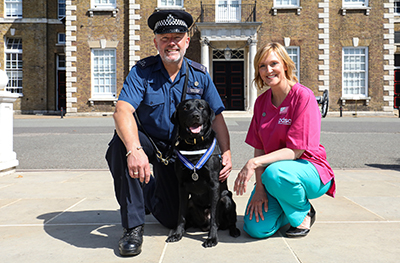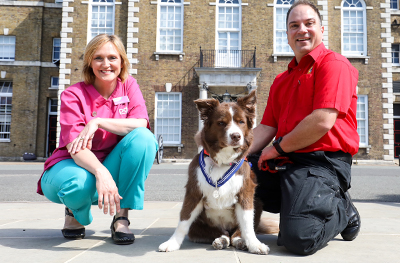Charity celebrates dogs' devotion and support.
Veterinary charity PDSA has awarded five special dogs with the PDSA Order of Merit in recognition of their achievements.
The PDSA Order of Merit was first awarded in 2014, and is given to animals who have provided exceptional acts of devotion to their owner or to society.
Nina Downing, PDSA veterinary nurse, said: “We have all been incredibly moved by the dogs’ emotive stories and their life-changing actions.
“PDSA is honoured to celebrate and mark their unstinting devotion to their roles and the remarkably positive impact they have had on so many people’s lives and wellbeing.
“The PDSA Order of Merit is a fitting tribute to each dog’s distinguished career, and they are all thoroughly deserving recipients.”
Police Dog Dexter
One such exceptional dog is Police Dog (PD) Dexter, who provides support to Metropolitan Police Officers and staff struggling with mental health and wellbeing.
Working with his handler, Police Constable Mike Sheather, PD Dexter provides struggling officers who need a physical and visual source of reassurance, and acts as a gateway for important discussions around mental health.
PC Sheather commented on the honour: “I’m absolutely delighted that Dexter, and the other extraordinary recipients, have been acknowledged by PDSA for the incredible work they do.
“The bond between humans and animals is so strong and can create really amazing life-changing benefits.
“We are proud to receive the PDSA Order of Merit and to have celebrated the enormous achievements of PD Dexter and other recipients of this prestigious accolade.”

Justice facility dog Oliver
Six-year-old Labrador Oliver is being awarded the Order of Merit for his work supporting victims of crime. Europe's first justice facility dog, Oliver helps victims of crime to relax when giving evidence, and provides emotional support to those who need it.
Oliver's emotional and physical support helps to give a victim the confidence to communicate in difficult situations like police interviews, bringing more criminals to justice.

Search and rescue dog Zak
Zak, who recently retired from his role as a search and rescue dog, has attended over 300 searches with his owner Kev Saunders MBE. Zak began his training at nine-weeks-old, and has helped to find and rescue vulnerable missing people.
Throughout his 11-year career, Zak has helped to rescue hundreds of people, with his ability to cover a search area far more quickly and efficiently than humans.
Of all the animals who have received PDSA accolades, Zak is the second animal to have received a PDSA Commendation and a PDSA Order of Merit.

Medical alert assistance dog Clive
Cocker Spaniel Clive began following his owner Michelle Sutherland around after she was diagnosed with Addison's disease, a rare disorder of the adrenal glands with life-threatening side effects.
Clive alerts Michelle when her cortisol levels drop, and he can also fetch emergency injections if needed, saving Michelle from thousands of ambulance call-outs and hospital stays.
Thanks to Clive's lifesaving alerts, Michelle was able to return to work, and can enjoy travelling and socialising again.

PTSD assistance dog Jerry
Eight-year-old cocker spaniel Jerry supports his owner Mark Lanchbery with Mark's Post-Traumatic Stress Disorder (PTSD). Mark was diagnosed with PTSD after sustaining life-changing injuries whilst serving with the British Army.
Jerry provides support to Mark in a number of ways, including waking him up if he is having nightmares in order to control his anxiety attacks.
He can also take clothes to the washing machine, turn lights on and off and fetch medication for Mark. He will wait with Mark until the medication has been taken.




 The Veterinary Medicines Directorate (VMD) is inviting applications from veterinary students to attend a one-week extramural studies (EMS) placement in July 2026.
The Veterinary Medicines Directorate (VMD) is inviting applications from veterinary students to attend a one-week extramural studies (EMS) placement in July 2026.